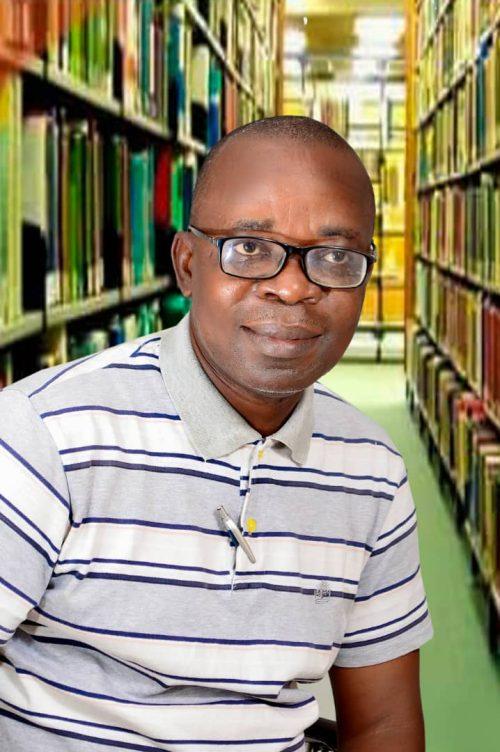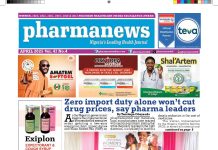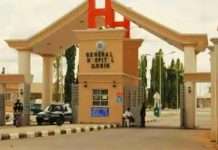
Mr Henry Ekom, managing director of Alrange Books, is very passionate about knowledge management. A graduate of English and Literary Studies from the University of Calabar, he believes that books are connected to the development of great nations. In this exclusive interview with Pharmanews, in commemoration of his company’s 25th anniversary, he shares the story of his foray into bookselling and how he has helped to shape the acquisition of knowledge in many Nigerian universities, especially in the faculties of pharmacy. Excerpts:
Kindly tell us about Alrange and what you stand for in the book marketing industry.
Alrange Limited is a professional book company. We deal on academic books for research, training and capacity development. We operate at the tertiary level, where we assist tertiary institutions, like universities, polytechnics, colleges of education and research centres. We assist them to source for quality books for their research and training.
We started as medical book consultants. We were bringing in medical books from all fields of like paediatrics, gynaecology, ENT, dentistry, pharmacy, pharmacology. We brought in those books and we helped in building teaching hospitals, colleges of medicine all over the country and beyond. We were fundamentally medical books consultants. We worked with different medical establishments, including private doctors whom we assisted with quality books for continuing education and training.
When we started, there was no HIV; but when HIV came, we had to bring in books in that area. As we went along, we had to also bring in books on virology, which helped in the handling of the Ebola virus. When COVID came in, we had to also bring in books in that area. We were in the medical books segment for eleven years before we moved fully into academic books marketing – all ranges of academic books. It is from here that we derived our name.
We provide books for civil engineers, petroleum engineers, mechanical engineers, marine engineers, food scientists, food technologists, nutritionists, sociologists, anthropologists, counsellors, educational managers, curriculum review experts, architects, lawyers, etc. We attend annual conferences of some professional bodies like the Nigerian Bar Association, the PSN and others, where we interface with lecturers and key people in these industries. We are able to know new trends in the teaching, training and research in these fields and that helps us to know the type of books to bring in to help both students and lecturers.
How involved have you been with the PSN?
The PSN has been very useful since we started this journey. I got involved with the PSN many years ago. I have also been involved with the Lagos State chapter of the body. I was always at their monthly meetings to exhibit my books. I have also partnered with the West African Postgraduate College of Pharmacists. We also attend their conferences and receive some of their members from other West African countries when they come in. We have provided them books on Clinical Pharmacy, Pharmaceutical Chemistry, Pharmaceutics and so on.
We have been able to attend so many PSN conferences across the country. We have been to Kano, Owerri, Abuja and have used that platform to expand our reach and we have also interfaced with many deans of the faculties of pharmacy. We have succeeded in working with many of them in equipping and upgrading their libraries. Through this same platform, we have made contact with pharmaceutical companies that need books on areas like quality control and quality assurance and we have been supplying them.
As you celebrate your 25th anniversary, what do you consider the most significant highpoint of this journey?
The highpoint of this journey has been our ability to package quality educational services to impact our educational institutions. I have also been able to develop myself to the extent that I am now able to advise institutions and libraries. Librarians now come to us because of our high level of trust in terms of capacity and service delivery. We have received a lot of acknowledgement from all over the place for what we have been doing these 25 years
.
Can you describe your operational presence in Nigeria?
Our presence in Nigeria is wide and varied. It was initially a bit limited but with our online platforms now, we have been able to break through all the states where serious academic work is going on. We have agents all over the country. When you have quality products like books and knowledge, you will have no hiding place.
Even people in government patronise us. They have seen our capacity and they trust us. Private universities, including the new ones springing up, the NUC and TETFUND, some of them send their agents to come and source books from us.
During the last administration, the finance minister came to us to buy books on International Economics. We were quite impressed that a woman of that calibre was still reading.
I am particularly impressed with my association with Pharmanews. I used to be a columnist on health and environmental issues. Pharmanews, as a leading health magazine, helped to expose me to the health industry.
How would you describe the response of pharmacy faculties to your services?
I have been fortunate to be one of the frontline marketers of pharmacy books to faculties of pharmacy in Nigeria. I have worked with the University of Jos, University of Nigeria, Nsukka, University of Port Harcourt, University of Uyo, the pharmaceutical research institute in Abuja and the University of Lagos.
I have engaged over 15 professors of pharmacy. Some are still alive while some have passed on. People like Professor Coker and Professor Ifudu. Some of them have written books that I am also marketing.
We have done so much for pharmacy faculties. For instance, I am the book consultant to Madonna University. We are now penetrating the private universities and we are doing very well.
Knowing that the reading culture in Nigeria is abysmally poor, coupled with the threat which the Internet poses, don’t you think your business can be affected?
Books are so important that they cannot be replaced by anything else. Even the Bible instructs us to study to show ourselves approved.
When you really want to study, you have to reach out for your books. The Internet can help with additional sources of information. And not all information that you see on the Internet is reliable.
The reading culture is bad because the young ones feel that education is no longer lucrative as a result of the “fast food” mentality. We try to puncture this argument by beginning to train the young ones through our NGO – the All Range Reading Academy. We have the Young Readers’ Academy where we go to schools, both private and public, to donate books to them and organise reading sessions for them. We also encourage them to write simple poems and short stories. This is a way to encourage reading culture so that when they grow up, books cannot be replaced in their minds. I always tell young people to leave Facebook and face their book.
How have you been surviving with the problem of piracy?
Piracy is an obvious threat, not only in Nigeria. It is a function of the poverty and hunger in the land. We are also working as a company and luckily for me, I am a member of the Booksellers Association of Nigeria. In fact, I am the current General Secretary of the association. We have our conference once in a year where we bring in all booksellers from across the world to showcase their products. We also bring in publishers and we are partnering with the Nigerian Copyright Commission to track down some of these violators of intellectual property rights. It is just like the war against counterfeit drugs. We are working very hard.
Piracy is unacceptable in our midst. We try as much as possible to encourage schools to partner with genuine booksellers. Our association has a list of all authentic booksellers in Nigeria. We are also working with the publishers’ association. We also work with the printers’ association. We go round to make sure that schools buy books only from genuine booksellers. We now have a platform where we exchange information in a bid to curb the excesses of pirates.
What is your motivation venturing into an area that is seen as not lucrative?
As a student of Literature, my passion for books remains indomitable. We read a lot of books while growing up, especially the popular African Writers’ Series and that inspired my decision to study Literature at the University of Calabar. It was fun reading. Our level of interaction helped us to expand the frontiers of knowledge.
Knowledge is essential for economic development and those of us who ventured into the book industry did not do so because of money.











I nominate Okeke Bethel Ikenna from University of Nigeria, Nsukka